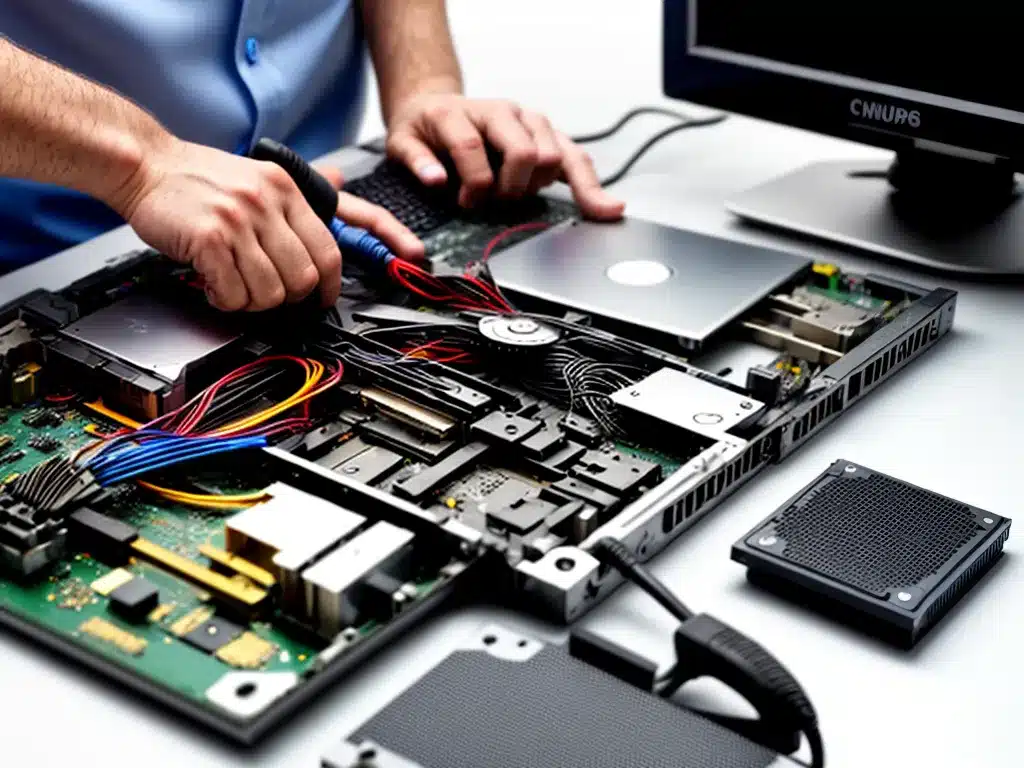
Introduction
As a computer repair technician, having the right tools can make a big difference in your ability to properly diagnose and fix computer problems. In this article, I will discuss the essential tools every computer repair toolkit should contain, factors to consider when choosing tools, and provide recommendations for specific tools and brands based on my experience.
Must-Have Tools
These are the core tools no computer repair toolkit should be without:
Screwdrivers
Screwdrivers are a must for opening up computer cases and working with internal components. At minimum, you need:
- A small Phillips head screwdriver
- A medium Phillips head screwdriver
- A small flathead screwdriver
- A medium flathead screwdriver
I recommend getting a screwdriver kit with multiple sizes and interchangeable bits for versatility.
Anti-Static Equipment
Static electricity can damage computer components, so anti-static gear is essential:
- Anti-static wrist strap – Worn around your wrist and attached to the computer case to ground you while working on internals.
- Anti-static mat – Place motherboards and other components on this static-dissipating mat surface.
- Anti-static bags – Store components in these specially coated bags that prevent static buildup.
Flashlight
A small LED flashlight helps illuminate hard to see areas inside a computer case. I recommend one with a flexible neck.
Computer Tool Kit
A basic computer tool kit provides assorted picks, tweezers, and other specialized tools for precision work. Useful for manipulating tiny hardware and reaching tight spaces.
Multimeter
A digital multimeter measures voltage, resistance, and current flow. Essential for diagnosing faulty parts and power supply issues.
Thermal Paste
Thermal paste aids heat transfer between the CPU and heat sink. Reapplying fresh paste can resolve overheating shutdowns.
Cleaning Tools
Compressed air, isopropyl alcohol, lint-free cloths, and Q-tips help clean internal computer dust buildup and allow proper cooling.
Additional Handy Tools
While not essential, these tools are nice-to-have for certain repairs:
- Soldering iron
- Cable tester
- Crimping tool
- Tweezers
- Wire cutters and strippers
Choosing Quality Tools
Here are key factors to consider when selecting tools:
- Durability – Opt for metal tools over plastic ones where possible. Better durability for regular professional use.
- Grip – Comfortable, ergonomic grips enable precise control and prevent hand fatigue.
- Reputation – Stick with established, reputable brands known for quality.
- Organization – Buy kits or cases to keep tools neatly arranged and portable.
- Budget – Quality toolkit essentials do not need to be expensive. Avoid overspending on unnecessary extras.
Recommended Brands and Models
Based on personal experience, these are quality tool brands and models I recommend:
- Anti-static gear: Belkin, KingWin
- Screwdrivers: Wiha, iFixit, Wera
- Multimeter: Fluke 117, Klein Tools MM700
- Flashlight: Nebo Inspector, Olight I3T
- Thermal paste: Arctic Silver, Noctua
- Tool kits: iFixit Pro Tech Toolkit, Stanley STMT71653
Of course, these are just suggestions – there are many comparable tool brands to consider. The key is sticking with reputable names known for computer repair quality.
Conclusion
Choosing the right tools for computer repair ensures you can properly diagnose problems, carefully work on sensitive components, and produce reliable fixes. Invest in durable, specialized computer repair tools from trusted brands. Quality tools, though not cheap, are worthwhile for regular professional use and will last for years. With the essential computer technician tools in your toolkit, you will be equipped to troubleshoot and repair computers efficiently. Let me know if you have any other questions!












